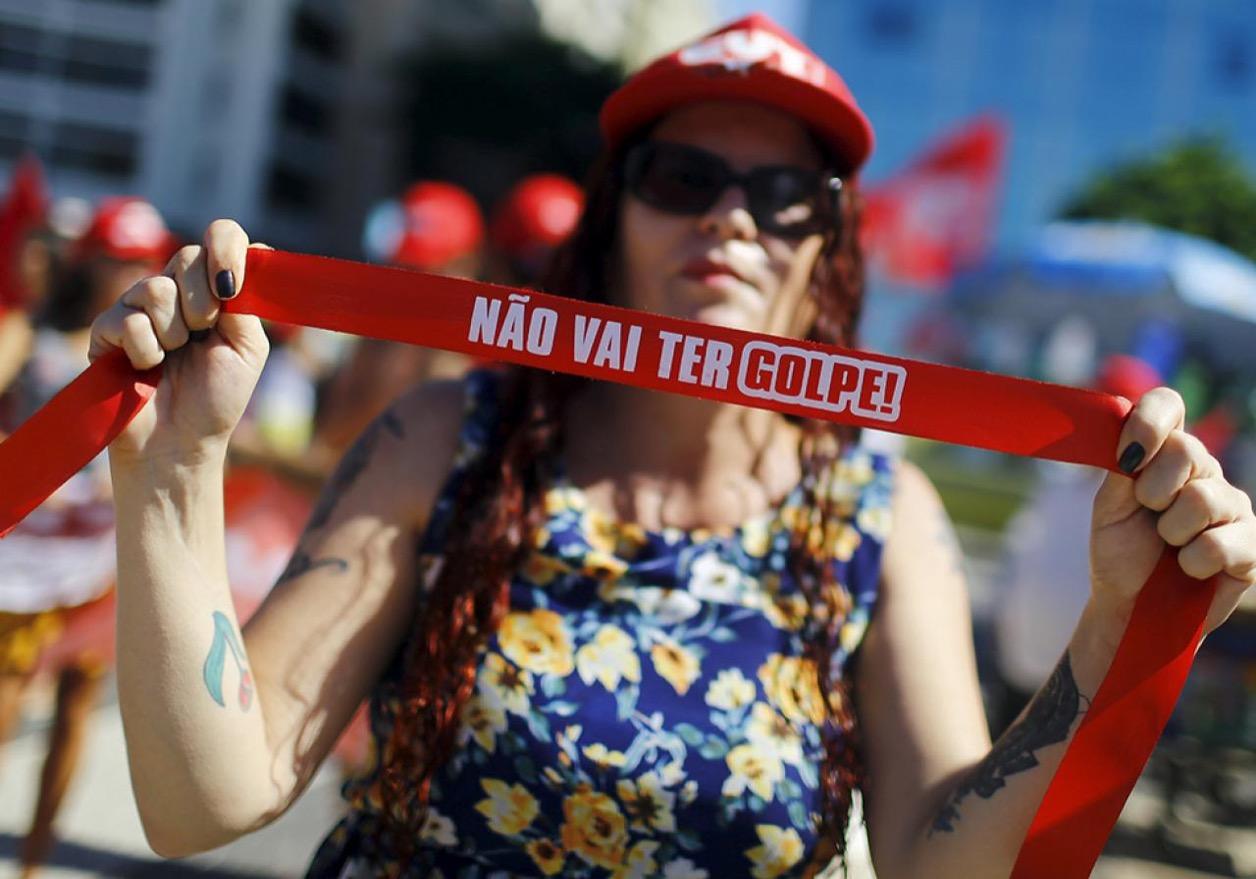Who actually wins if Brazil impeaches its president?
Brazilians in favor of impeaching President Dilma Rousseff cheered with each vote in favor in the lower house of Congress in Brazil on April 17.
Perhaps the most striking image in Brazil’s capital this weekend was a metal fence, erected along the grassy esplanade that rolls northwest from Brasilia’s iconic Congress building.
Flanked by dozens of military police officers on either side, the fence was separating two angry protest groups: one calling for the ouster of President Dilma Rousseff, decked out in green and yellow; the other supporting the embattled leader and her Workers’ Party, in red.
The barrier couldn’t have been more poignant, especially as the sun set on Sunday and Congress’ lower house began voting to impeach Rousseff, eliciting alternating cheers and boos as each vote was cast.
But while that divide made for interesting optics, the reality on each side of the fence was a lot more complicated. And the thing about Sunday’s vote is, while there appeared to be one clear winner — the pro-impeachment camp — very few truly triumphed.

Well into Sunday night, lawmakers had voted 367 to 137 in favor of impeaching Rousseff, far higher than the two-thirds needed to move the process forward. Next, the Senate will vote on whether to begin impeachment hearings, on accusations she illegally fudged government account numbers.
Rousseff is not charged with a crime and denies any wrongdoing. Late Monday, she slammed the congressional vote, saying, “It was an immense violence against truth, democracy and the rule of law.”
But most observers predict Rousseff’s days are numbered.
It's a lot less cut and dried how much a change in leadership would placate the angry hordes that have taken to the streets in near-record numbers this year.
Despite appearances, none of the people interviewed for this story on the anti-impeachment side of the fence expressed passionate support for Rousseff. At best, their endorsement was lukewarm.
One reason they gave was a broader defense of Brazil’s democratic process. The majority of “red shirts” interviewed said they saw Rousseff’s impeachment as “a coup.” That argument has only gained steam throughout the congressional debate. (It doesn’t help that Rousseff’s alleged impeachable crimes barely even came up during Sunday's vote.)

The Workers’ Party, one of the largest in Congress, has vowed not to recognize the government that will take over from Rousseff.
On the pro-impeachment side of the fence, where protesters wore yellow and green, Brazil’s national colors, there was also ambivalence.
Most impeachment supporters interviewed described Rousseff in benign terms: They don’t like her much, but they don’t hate her either. And they don’t see her as particularly corrupt.
So, why do they want to take the extraordinary step of throwing her out of office?
It would be wrong to suggest there isn’t a faction in the green-and-yellow camp that loathes Rousseff and everything she believes in. But much of the focus of this side of the protests appeared to be less on this individual president, and more on Brazil’s despised political class and foundering political system.
Pro-impeachment protester after protester said the same thing: Rousseff is just the first domino to fall. After her, the green-and-yellows said, they will focus on the succession of politicians who take her reins. The goal, in their view, is to start a process of “cleaning out” the rest of Brazil’s political leaders.
Here’s how 73-year-old retired teacher Regina Lucia Gonçalves da Silva put it: “The corruption investigations will continue. We’ve already kicked one out, now we’ll kick out another, and another and another. This is part of learning about democracy.”
As such, Rousseff’s ouster would only be a partial victory for many on the pro-impeachment side.
In spite of all the differences, the campaign against Brazil’s politicians is something that unites people here. To put it simply: Most Brazilians loathe their politicians.
More than a quarter of the lower house of Congress and a third of senators currently face criminal charges, according to the Brasilia-based watchdog Congress in Focus, and Brazilians on both sides of the fence are sick and tired of this.
Brian Winter, vice president of policy at the Americas Society and Council of the Americas, describes the current mood in Brazil as a “fora todos eles” (out with them all) moment. Here’s what he wrote about a post-impeachment Brazil in a recent analysis in Americas Quarterly:
“The sight of figures like Eduardo Cunha, a legislator who faces multiple corruption charges, reminded everyone that several of the PMDB’s leaders are arguably just as tainted as Rousseff by the scandals and economic mismanagement of recent years. The ensuing national mood was best captured by, of all people, a Supreme Court justice caught unaware by an open microphone. ‘My God in heaven, is that the only other choice we have for a government?’ Justice Luís Roberto Barroso was overheard marveling to a group of students. ‘There’s nowhere to run. This is a disaster.’”
With Rousseff on the ropes, what many will be watching for now is whether, in the coming weeks, the green-and-yellows will stay on the streets. Many observers believe the impeachment push has been driven by Brazil’s conservative-dominated media, and question whether that attention will remain if Rousseff is replaced with her centrist, business-friendly vice president, Michel Temer.
By Monday afternoon, the fence dividing Brazilians was already being dismantled. It’s possible, one day, many of the green-and-yellows and the red shirts could discover they had a common goal all along: kicking everybody out of power and starting again.
Every day, reporters and producers at The World are hard at work bringing you human-centered news from across the globe. But we can’t do it without you. We need your support to ensure we can continue this work for another year.
Make a gift today, and you’ll help us unlock a matching gift of $67,000!
